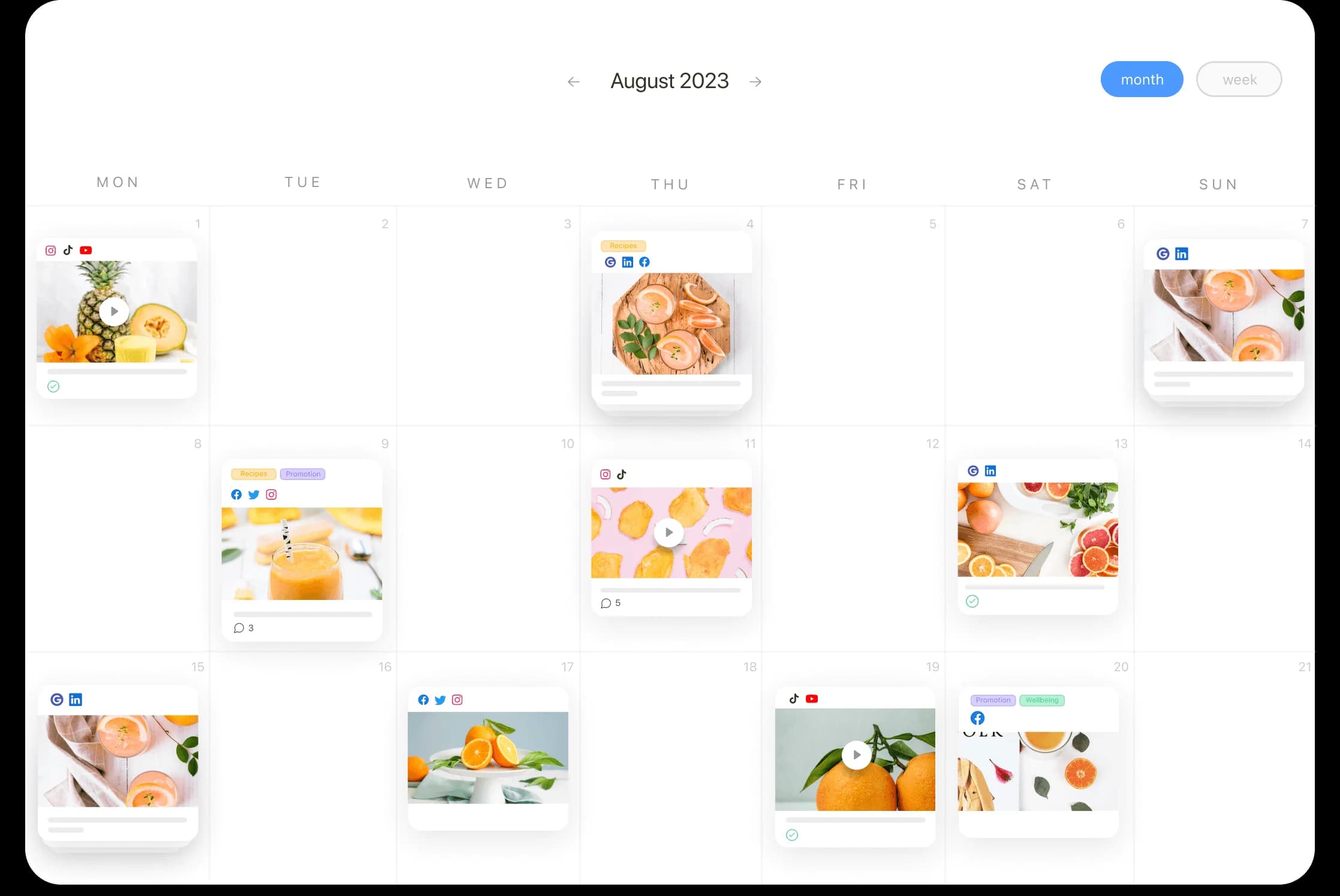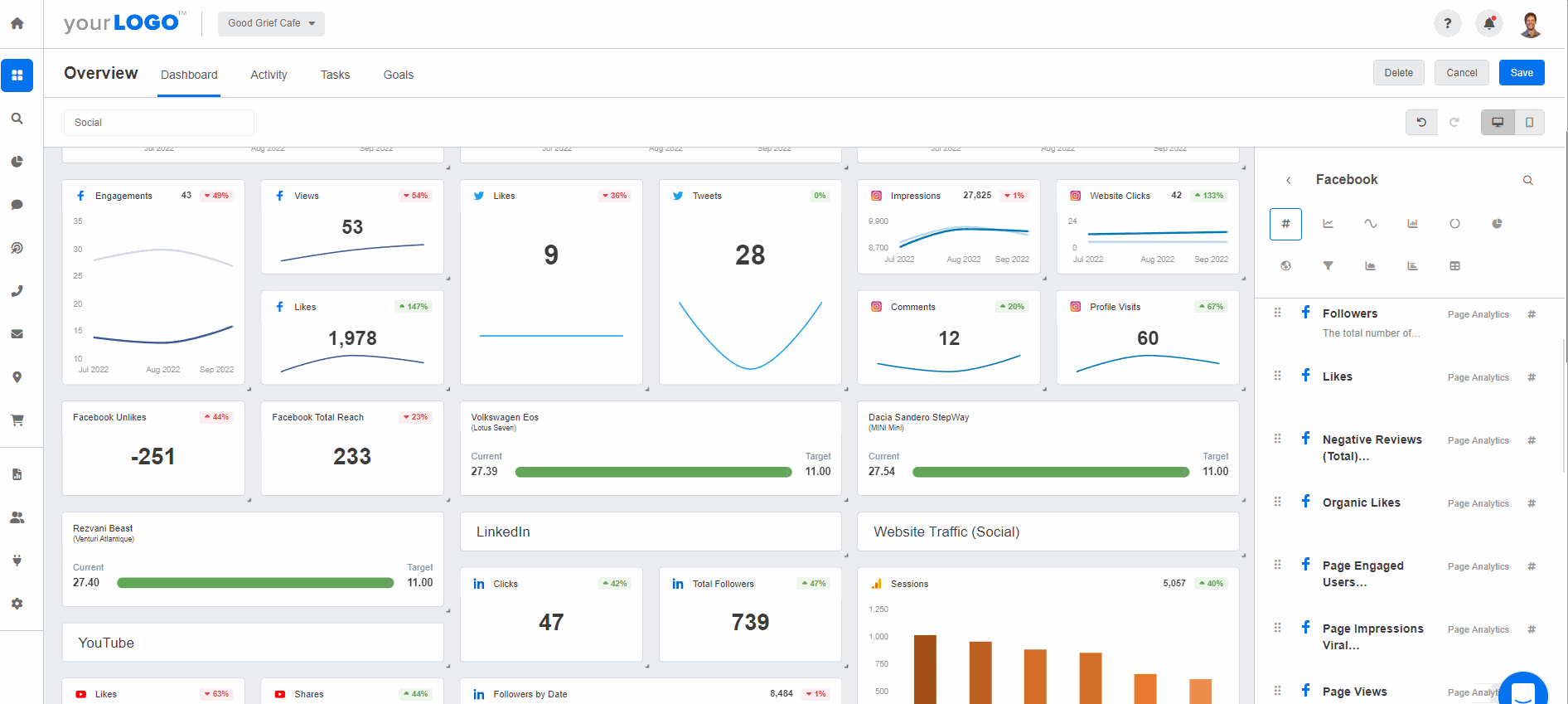Table of Contents
QUICK SUMMARY:
A social media approval process is a system where content is reviewed and approved before publication. It ensures quality, accuracy, and brand alignment, necessary for maintaining the reputation of both the client and the agency. This article explains how to implement a scalable approval process and highlights its importance for effective social media campaigns.
Social media approval systems may not sound like the hottest topic, but they should be an essential part of every agency’s social media initiative.
As your agency grows, so will the multitude of social media messages that are being created by your team. This can lead to issues of quality control and accuracy. After all, it's easy enough to monitor social output when there are one or two clients, but scale that up to 15, 50, or 200 and it becomes exponentially more challenging to monitor.
Social media approval systems help streamline processes and minimize errors. In addition, they help protect the client's (and the agency's) reputation by ensuring that only accurate and approved information is shared.
With formal approval systems in place, your agency controls the quality of the content that goes live on each clients' social media platforms.
This piece will cover social media approval systems, how to build one in a scalable way, and why they're essential to the overall health of your clients' social media campaigns.
What Is a Social Media Approval System?
In its simplest terms, a social media approval system is a process by which teams review and approve content before it's published on social media. This can include any form of content and, in some cases, even comments (think branded replies or automated comments offering additional resources).
The idea is to prevent any potentially harmful content from being shared and to ensure that your social media posts are on brand and on target. After all, we've all seen what can happen when brands make a social media blunder.
That's the gist of it–but like all things, there's more to social media approval systems than that. To fully understand its utility, we must look under the hood.
Who Actually Needs a Social Media Approval Process?
The answer to this question may seem obvious, but it's worth stating nonetheless: any marketing agency, business, or organization that uses social media needs a social media approval system.
Think of it this way: the bigger the team, the bigger the need for a clear and (potentially) multi-level approval process. The more people are involved, the higher the risk of things slipping through the cracks.
Your agency's process isn’t something your clients should worry about, nor you–it should be seamlessly integrated into your workflows so you can focus on core social media metrics for your clients and increase those numbers.
For the sake of simplicity, these questions will determine if you do need a social media approval process:
1. Do you regularly publish content for your clients?
2. Is there more than one person involved in creating, scheduling, publishing, copy-editing, and managing assets (e.g., multiple Social Media Managers across client accounts)?
3. Is there a designated approver on the team?
4. Do you manage multiple pages, possibly with localized content?
If the answer is "yes," to any of these, then you probably need a social media approval process.
Why a Social Media Approval Process Is Important
A social media approval process is crucial in any content marketing strategy. It ensures that all content is high-quality, accurate, and on-brand before it is published.
An effective content approval process will vary depending on the size and structure of your organization, but there are a few core benefits of creating and implementing a social media approval process.
1. Get Fewer Notifications and Messages
If you have a lot of people on your social media team, you probably receive many notifications and messages. This can be overwhelming and make it challenging to stay organized, even for an experienced Social Media Manager.
An approval system can help reduce the number of notifications and messages you receive. By automating the content review process, you can avoid having to constantly communicate with team members about each piece of content.
2. Stick to a Consistent Social Media Posting Schedule
One of the most critical aspects of social media marketing is consistency. To maintain a strong presence on social media, it’s not just about posting time, but you must post regularly. A consistent posting schedule can be a challenge, especially when you're managing multiple social media accounts alongside other marketing channels.
An approval system can help you stay on track by ensuring that all content is reviewed and approved on time. This also means no last-minute scrambling to get content published—a few clicks and the job's done.
3. Save a Lot of Time
Another benefit of an approval system is that it can save your agency a lot of time. If you don't have a system in place, you may find yourself spending hours reviewing and approving content. Only to discover—hours later—that someone else on the team had already reviewed and approved those posts.
With an approval system in place, you can automate the content approval and review process so that all pieces of content are automatically sent to the appropriate team members and then to clients for review. This will free up your time to focus on other aspects of your job.
4. Encourage Trust and Transparency in the Team
Another significant benefit of an approval system is that it builds trust and transparency among team members. When everyone is aware of the approval process, there is less room for miscommunication and misunderstanding, as these types of issues can spill over into your relationship with the client.
5. Avoid Password Sharing and Controls Access to Social Media Accounts
If you have a lot of people on your team, it can be tempting to just give everyone the login information for all of the social media accounts.
But this is not a good idea. First, it creates a security risk. For example, if a team member leaves the agency, you have to change dozens—if not hundreds—of passwords. Second, it makes it difficult to track who is posting what.
If you want to avoid password sharing, use an approval system to control access to your social media accounts. This way, only team members who need access will be able to log in.
Agency Tip: Centralizing access is also one of the benefits of an automated client reporting system, as each team member is granted access to the reports they need and don't have access to every client's social media passwords.
6. Faster and Smoother Scaling
Faster and more efficient approvals equal more work being delivered. But that's only one benefit. Sturdy social media approval processes will make it easier to collaborate with external parties (freelancers) and outsource additional work so that your agency can focus on the macro side of projects.
This will allow you to expand your client base and services and, by extension, scale your agency.
7. Collaborate More Easily With Clients
An approval system can make collaboration easy when you work with clients. By using an approval system, you can give clients access to your social media accounts so that they can review and approve content before it is published. There will be no need for constant back-and-forth emails or phone calls because everything can be done in one central location.
Plus, if you ever need to provide evidence of client approval, you'll have it all stored in one place.
How To Build an Internal Social Media Approval System
There are a few different ways your agency can build an internal social media approval system. The method that you choose will depend on the size of your team, the number of social media accounts that you need to manage, and the type of content that you typically share.
1. Define Approval Hierarchies/Processes
The first step is to actually define your agency's social media approval workflow. For that, you will need to ask yourself the following:
Who is responsible for content creation?
What content needs approval?
Who will approve the content?
When is approval needed?
How long does approval take?
What if the content is not approved?
Appealing a decision
Who is responsible for making sure the content goes live when it's supposed to?
What are the contingency plans? If, say, a social media post goes live before it is finished?
This is one of the simplest structures possible, but it's a good starting point as it will help you set a strong foundation on which you can build in the future and scale.
2. Set Deadlines To Avoid Roadblocks
Deadlines don't exist to stifle creativity. Their purpose is to confer a sense of linearity to projects and prevent roadblocks.
Now, while external deadlines are a natural part of every client-agency relationship, internal deadlines are also important. These deadlines should cover:
The estimated time of production for any piece of content or assets, whether posts, visuals, or videos.
Estimated time of proofreading/internal feedback.
Having set deadlines for the latter is especially crucial because nothing reduces productivity to a screeching halt faster than endless feedback loops. Therefore, your internal feedback deadlines should be designed in such a way that they prioritize delivering the work to the client fast without sacrificing internal-reviewing quality.
3. Build a Content Calendar
Another way to build a social media approval process is to create a designated content calendar. This calendar should include all the details of what content is being made when it is published, and who is responsible for each piece.
It can be as simple or complex as you need it to be, but at its core, the content calendar should provide a clear overview of what content is being created and when it will be published.

The content calendar can be used in conjunction with your guidelines, or it can be used as a standalone system. If you choose to use a content calendar, you will need to decide how far in advance the calendar should be created.
For example, you may choose to create the calendar on a monthly basis, or you may opt for a more flexible system that allows multiple team members to submit content for approval.
No matter which system you choose, it is important to have a clear and concise social media content approval process. It should be well-documented and easy to understand so that all team members are aware of what is expected of them.
4. Use Dedicated Calendar & Social Media Management Tools
Also very important: your approval process should be tailored to the specific needs of your marketing team and your social media accounts. There is no one-size-fits-all solution, so take the time to experiment with different methods until you find what works best for you.
There are social media calendars and approval tools out there that can simplify this process immensely by centralizing everything in one place with features like:
Team communication
Feedback-sharing
Content calendars
Customizable social media approval workflows
For example, Planable has four types of approval: none, optional, required, and multi-level.
The latter (multi-level) is especially suited for teams with multiple stakeholders and clients, a.i. agencies. It's also a way to keep everyone on the same page.
With it, you can set as many levels as you need and assign collaborators to each level. Each level can have one or multiple approvers. The approval of one person will push the content to the next layer. Once the content goes through all the stages of approval, the content is ready to be published.
So, essentially, the right social media approval tool takes all those nebulous processes that we've covered so far in this article and make them, well, less nebulous by presenting them in a visual, easy-to-understand way.
The Pros and Cons of Including Clients in the Approval System
Clients can also easily be integrated into this workflow to add their own content to the calendar for approval.
PROS
✅More original content to work with when clients contribute
✅An easier way for clients to share their photos/videos
✅Streamlined idea sharing with clients without the back-and-forth emails
✅Client's stamp of approval on all content that is published (this is especially helpful in the beginning as the agency is getting to know the brand)
CONS
❌Risk of getting too much feedback from overinvolved clients
❌Adding another player in the mix can result in the production slow-down
❌Creating a bottleneck in the approval process
❌The need to please clients might overtake the need to create content that is proven to be effective
Conclusion
A social media approval process is a valuable asset for any social media agency, across all social media channels. It saves you time, builds trust among team members, and makes it easier to collaborate with your clients. Additionally, a transparent approval workflow system prevents internal and external miscommunication issues.
If you're not using an approval system, now is the time to start. You can even include it in your social media proposal that differentiates your winning system compared to your competitors to get more clients.
If you're looking to streamline your social media workflows and provide your clients with clear, professional reporting, consider integrating a tool like AgencyAnalytics' social media marketing report template. It can save you time and elevate the reporting you provide to clients.
Ready to automate workflows and enhance your client's social media strategy?

Track your campaign success with AgencyAnalytics’ social media dashboards to house all your clients’ real-time metrics in one place. Flip them into client-ready reports in minutes! Start your free 14-day trial today.

Written by
Content marketer and aspiring YouTuber, in no particular order. Expertise in content writing, social media, copywriting, and neo-noir graphic novels. Used to run a music webzine in the 2 seconds in the early 2010s when blogs were hot. I tweet very badly on Twitter.
See how 7,000+ marketing agencies help clients win
Free 14-day trial. No credit card required.






